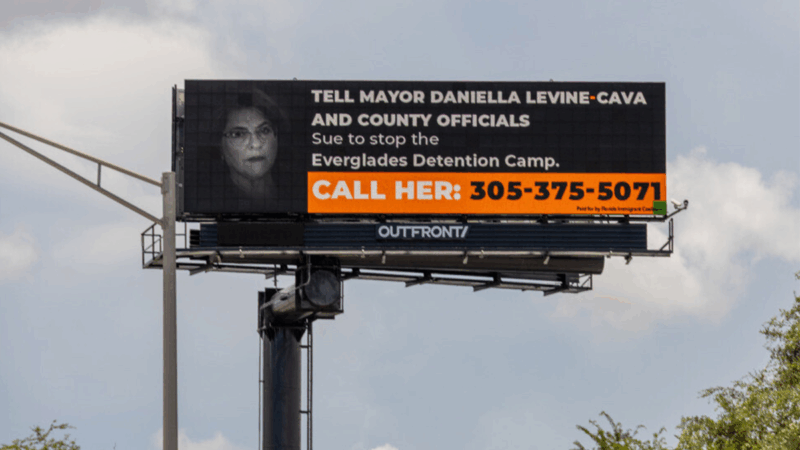Immigrant Rights Group Says Its Billboards Opposing Alligator Alcatraz Were Taken Down Under Political Pressure
The Florida Immigrant Coalition's new billboards were restored less than a day after being taken down, but why were they removed in the first place?

Politics moves fast in Florida. Take the case of two new digital billboards opposing the state's Alligator Alcatraz detention camp. The billboards were purchased by the Florida Immigrant Coalition (FLIC), a statewide coalition of immigrant rights groups.
FLIC's ads were mysteriously taken down last week, less than 24 hours after going up, allegedly because of pressure from a state official. They were restored a day later.
Last Monday afternoon, the FLIC's new digital billboard advertisements appeared at two locations in Miami-Dade County. "Tell Mayor Daniella Levine Cava and County Officials: Sue to stop the Everglades Detention Camp," the ads read.
It's what they call in the communications business a "call to action."
But the next morning, Thomas Kennedy, a policy analyst at FLIC, says the organization got a call from Outfront, the advertising company that operates the billboards, telling them their ads were no longer running.
"The sales guy tells me, 'We're going to have to take this billboard down while our political team gets involved to basically review them,'" Kennedy recalls.
Kennedy says the sales rep at first told him that the company had received a complaint from the Miami-Dade County government that the ads were nonfactual, which was odd, since they didn't make any factual claims.
Kennedy says Outfront offered a refund or an opportunity to modify the text, but he declined. By Wednesday morning, the company had cleared the billboards to go back up.
Kennedy stresses that his gripe isn't with the employee or Outfront so much, but the fact that someone appeared to be using political pressure to silence his organization.
"It's outrageous," he says. "We paid $12,000 for these two billboards."
And the question remains of who called to complain about the ads. Kennedy says that, after pressing more, he received a text from an Outfront sales executive saying that they had not been contacted by someone from Miami-Dade County but rather a state official.
"I spoke with the mayor's chief of staff and deputy chief of staff and they keep saying they did not contact you all to take it down," Kennedy texted. "Was it her political team that called? There's nothing non-factual about the ad so we are just very confused."
"Kevin Guthrie the executive director of Florida Division of Emergency Management is who reached out," the response to Kennedy reads. (The listed phone number did not respond to request for comment.)
The FDEM is the state agency that built and manages the new immigrant detention camp in the Everglades, which officials have gleefully dubbed "Alligator Alcatraz."
The FDEM denies the accusation. "The claims about Executive Director Guthrie are completely false," Stephanie Hartman, an FDEM spokesperson, said in a statement to Reason.
Such an act would be an egregious example of government jawboning—that is, using the threat of government action to indirectly and inappropriately compel private speech.
It's possible that the identity of the complainant was garbled in the game of telephone among Kennedy, the sales rep, and however many other Outfront employees were involved. But it would also be in line with other recent examples of the Florida state government retaliating against disfavored speech, despite Republican Gov. Ron DeSantis' campaign to brand the state as "Free Florida."
In June, Florida's child welfare agency sent a cease-and-desist letter to the Orlando Sentinel demanding that it stop interviewing foster families as part of an investigation into a nonprofit associated with DeSantis' wife, Casey DeSantis.
And last year, Florida's state health department threatened local TV stations for running commercials in favor of an abortion amendment to the state constitution, claiming the ads were false and dangerous. A federal judge blocked the department from issuing further threats, writing, "The government cannot excuse its indirect censorship of political speech simply by declaring the disfavored speech is 'false.'"
"They've done this before," Kennedy says. "They do this all the time."


Show Comments (27)